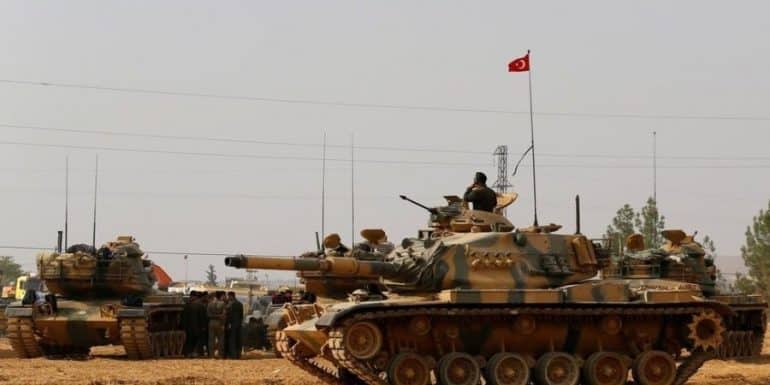Defying calls for restraint from Washington and Moscow, Turkey struck multiple targets in Syria on Tuesday, while President Recep Tayyip Erdogan renewed his threat to "soon" launch a ground operation against Kurdish fighters in the north.
Mr Erdogan has been threatening since May to order a large-scale ground operation in Syria's north, but the Nov. 13 bomb blast in the heart of Istanbul, which his government blamed on the PKK (Kurdistan Workers' Party) and in the YPG (People's Protection Units), may accelerate developments.
Since Sunday, "we have been smashing terrorists with our planes and drones," the Turkish head of state said during a speech yesterday. "God willing, we will soon annihilate them with our soldiers, our cannons and our tanks."
In the early hours of Sunday, the Turkish air force began Operation Forked Sword, striking some 89 PKK and YPG positions in northern Iraq and northern Syria, killing some forty Kurdish fighters, according to the non-governmental Syrian Observatory for Human Rights.
Last night, Turkish artillery continued to bombard the iconic city of Kobani, a stronghold of the YPG that was captured in 2015 from the jihadists of the Islamic State (IS) organization with the support of the West, the same NGO said.
During the day, new strikes by Turkish UAVs were reported, particularly against a joint base of Kurdish forces and the US-led international anti-jihadist coalition, 25 kilometers from the city of Hasakah, where two people were killed, according to Kurdish forces and the Syrian Observatory for Human Rights.
Five civilians, including a child, were also killed in Azaz, Aleppo province, while three Syrian soldiers were killed and many others wounded in a shelling of an airbase not far from Azaz.
Other bombings targeted an oil well near the border town of al-Qahtaniyya, an AFP correspondent found.
"de-escalation"
"They want to establish a terrorist state around us, we cannot allow that. Protecting our borders and our nation is our responsibility and duty," Turkish Interior Minister Suleyman Soylu said.
The Turkish government will "make sure that those responsible for terrorist acts on the country's territory pay", President Erdogan announced yesterday Monday.
His remarks, after rockets were fired from Syria that killed two people, including a child, in the border town of Karkamish (southeast), prompted the US and Russian governments to react.
Washington and Moscow have been embroiled in the war in Syria, which has killed an estimated half a million people and uprooted millions more since 2011.
"We are calling for a de-escalation in Syria to protect civilians and support our shared goal of defeating the Islamic State," State Department spokesman Ned Price said.
The US has provided support to the YPG, Syria's main Kurdish group, in its fight against IS jihadists, instrumental in regaining control of Kobani in 2015.
John Kirby, a spokesman for the White House National Security Council, acknowledged that Turkey remains exposed to a "terrorist threat" and "has the right to defend itself and defend its citizens."
However, he added, these "cross-border" operations "may lead to a backlash from some of our partners in the SDF (Syrian Democratic Forces, of which the YPG is a key component), which would limit their ability to continue the fight against him Islamic State".
"We want to be able to keep the pressure on IS. This network is worn out, but it is still (…) a threat. Consequently, we would like our partners in the GDR to continue to keep the pressure on,” explained Mr Kerby.
"Risk of destabilization"
Russia, for its part, expressed the "hope" that Turkey will show "restraint" and refrain from "any use of excessive force" in Syria.
"We understand Turkey's concerns (...). But at the same time, we call on all parties to refrain from any initiative that could lead to serious destabilization," Kremlin spokesman Dmitry Peskov said.
On Monday, Berlin and Paris called on Ankara to act in a "proportionate" manner and "show more restraint" respectively.
For its part, Turkey yesterday demanded that its allies, above all the US, "stop all support" to the YPG.
The SDD assures that they seek "de-escalation".
From 2016 to 2019, Turkey's military conducted three large-scale operations in northern Syria against Kurdish paramilitaries and other organizations.
Ankara has repeatedly expressed its intention to create a 30-kilometer-deep "security zone" along its southern border.
For American analyst Anthony Skinner, the conditions are now in place for Turkey to launch a "brutal" operation against the PKK and YPG as the June 2023 "presidential and parliamentary elections" approach. In his view, President Erdogan is determined to play "the security card" ahead of the elections.
Nearly 500 targets have been hit so far in Iraq and Syria, according to Defense Minister Akar
Nearly 500 targets have been hit by Turkey's air force and artillery in northern Iraq and Syria since Sunday, Turkish Defense Minister Hulusi Akar announced today.
"471 targets have been hit and 254 terrorists have been neutralized so far" in the operation against Kurdish militant positions, Akar explained.
Turkey launched Operation Forked Sword on Sunday, a series of airstrikes and artillery fire against positions of the Kurdistan Workers' Party (PKK) and the People's Protection Units (YPG).
Ankara blames the PKK and YPG for the November 13 bombing in Istanbul, which killed six people and wounded 81 others. The groups deny any involvement.
According to the Syrian Observatory for Human Rights, these strikes have killed around 40 people.
Source: RES-EAP
